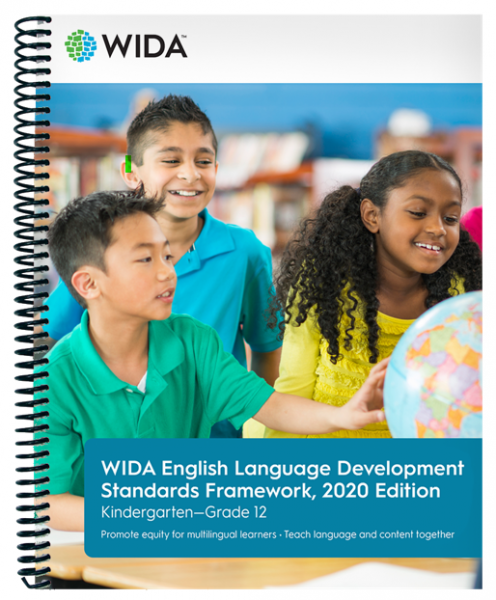The newly released WIDA English Language Development Standards Framework, 2020 Edition: Kindergarten-Grade 12 brings a focus on instruction for English learners (ELs) that is assets-based, equitable, collaborative, functional and integrates language and content. With this focus in mind, these standards bring educators closer to their goals of guiding students towards meeting their academic and language goals. WIDA’s suite of screeners and assessments continue to be informed by this framework.
Why do I need to know this? DC adopted the WIDA English Language Development (ELD) standards as the state’s standards to drive instruction for ELs to meet both their English language proficiency and academic content attainment goals. As such, the WIDA standards should be guiding curriculum, instruction and assessment for multilingual learners in grades K-12 across the District. LEAs should have systems in place for ELD specialists, general education teachers, special education, and enrichment teachers to collaborate to provide both content and language instruction to develop speaking, reading, writing and listening skills in English.
What is in the framework? The framework is organized around the five ELD standards, which remain the same. Within the document are comprehensive explanations of language development and use in instructional settings for each of WIDA’s six grade bands. The big ideas behind the 2020 edition are:
- Equity of opportunity and access,
- Integration of content and language,
- Collaboration among stakeholders, and
- A functional approach to language development.
Resources for LEA leaders and EL Coordinators
- OSSE Training Sessions
- WIDA’s standards webpage
- WIDA’s Self-Facilitated eLearning Courses: eight free on-demand courses rooted in the ELD Standards Framework including Engaging with the WIDA Standards: A Collaborative Approach
- 2020 Edition Q&A Webinar series where educators can hear from members of the WIDA standards development team and ask questions live or view the archived recordings.
- Q&A Webinar Schedule
- Introduction to the 2020 Edition: Big Ideas and the WIDA ELD Standards Framework (recording)
- Introduction to the Updated Key Language Uses (recording)
- Curricular Considerations: Introduction to Collaborating around the WIDA ELD Standards Framework, 2020 Edition (recording)
- Putting it all together: Next Steps for Utilizing the WIDA ELD Standards Framework, 2020 Edition (recording)
Any teacher who has an EL in their classroom can learn about using the new framework to plan and deliver lessons as well as create and evaluate the results of formative assessments with the following resources:
- Collaboration: Working Together to Serve Multilingual Learners, WIDA’s Focus Bulletin written to support the framework’s “Big Idea” of collaboration to support ELs growth in English language development and academic knowledge and skills.
- Educación en el mundo actual (English) | Educación en el mundo actual (Español), WIDA’s Focus Bulletin supporting the framework’s “Big Idea” of equity in the classroom for multilingual learners.
Families can also benefit from learning about the WIDA ELD Standards Framework to understand how EL programs and services support their child’s development of the English language. Additionally, families can use concepts from the framework to learn how to support their child with language and academics at home. Educators can make home-school connections by having conversations with families rooted in the following resources:
- Can Do Philosophy support teachers’ and families’ understanding of what multilingual learners can do at various stages of language development.
- Guiding Principles of Language Development are printed in 13 languages to help teachers and families have conversations around the value of each child’s culture and language and how this value can be leveraged in instruction.


